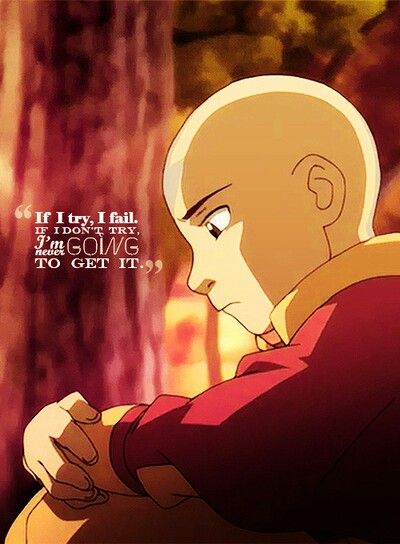Aang is exceptionally well-traveled and worldly for a twelve-year-old. He prides himself on his vast network of connections that not only transcend national borders, but even lifetimes. He is always receptive to the lessons imparted during his travels; Iroh explains the wisdom of this receptiveness towards learning from other people and cultures.
Aang is also the last of a vanished people, an outsider a century removed from his own time. As one of the few remaining people in the world who grew up in an era of peace, his worldview contrasts sharply with those born in a world worn down by conflict and cynicism. This difference in perspectives is best illustrated in The Avatar and the Firelord, one of the standout episodes of the series. After Aang informs his friends of the friendship and betrayal between Firelord Sozin and Roku, the previous Avatar, the others react in disgust. But Aang has a different interpretation of the same events.

Like Kamin from The Inner Light, the protagonist of a previous Ekostory, Aang’s role as the outsider is of great significance. By being free from a century of conventions and traditions built up by the three remaining nations, he is able to see things and people differently. His friends, having lived life in a war-torn world, find it difficult, if not impossible, to accept Fire Nation people as anything more than soldiers and inhuman monsters. But Aang is able to see people not merely as vessels of good and evil, but as individuals with choice, each deserving of a chance. He understands that while those we perceive to be evil may be misguided or may have diametrically opposed points of view from us, they still deserve fundamental decency and kindness. This is a powerful message that applies not only for the fictional world of Avatar, but to our own as well. Both are in need of more peace, understanding, and respect.

Aang’s ability to shift between light-hearted childishness and deep maturity is what I appreciate most about his character. Throughout his development over three seasons, he learns to shoulder the burdens of being the Avatar without losing his inner child. His personality is such that even as the most powerful force in the Avatar universe, he will always be a kid at heart, making jewelry, riding various types of animals, and taking mini-vacations with gophers. But at the conclusion of his character arc and the narrative, he proves that he is able to step up, push through the obstacles in his path, and do what needs to be done in order to fulfill his duties as the Avatar.
Aang’s ability to balance his childish wonder and attitude with his responsibilities comes from having a high emotional intelligence quotient. He knows and understands himself, yet is not afraid to show emotion and talk out his problems, especially to Katara. The show explicitly shows that the few instances in which he tries to wall himself off from others actually lead to the detriment of himself and those around him (The Serpent’s Pass & The Awakening). Avatar shows that Aang’s high degree of self-awareness and his willingness to establish open and honest channels of communications are his core strengths; with them he is able to move on from the mental guilt of losing his people and tackle the daunting challenges that lay in his path.
What’s personally intriguing to me is that Aang manages to eschew many of the traits that define the majority of male protagonists in favour of being a balanced and emotionally mature individual. As an Air Nomad monk, he values teachings, experiences, and relationships over material goods; the objects he genuinely treasures are things that remind him of his past and his connection to the world. As a pacifist, he uses force only in the defense of self and others, as a regrettable necessity, understanding that an aggressive attitude only perpetuates an escalating cycle of retaliation and resentment. He never revels in the act of violence itself, being constantly afraid at the devastation that his uncontrolled Avatar spirit would unleash upon the world.
Here’s a scrawny bald vegetarian boy who saves the world, born with great power but does not revel in its use. Instead, he constantly demonstrates empathy towards others, is not afraid to show emotions and rely on others, and is a genuinely nice, considerate, and worldly individual. Aang is as nontraditional and unconventional a male hero in today’s Western popular culture as one can get, and a much-needed positive role model for children and adults alike. We need more depictions of heroes in popular media who can be balanced and emotionally mature, acting as leaders for change by being strong and sustainable from within.

What is intriguing about the narrative of Avatar is that the ultimate resolution of this American action cartoon lies in growth of Aang as a person. The final battle against the Firelord does not merely tests his fighting prowess, but his moral fortitude.
The central conflict of the finale revolves around Aang’s struggle to reconcile his own values as an Air Nomad and his duties as the Avatar. As a pacifist monk with a deep respect for life, Aang does not want to kill Firelord Ozai even as he threatens to destroy the world. Everyone deems it necessary that the Firelord be killed in retribution for his and his ancestors’ war crimes; even Aang’s friends, including Ozai’s own son, see no other way to secure peace and are dismissive of Aang’s moral dilemma. The Fire Nation, Earth Kingdom, and Water Tribe Avatars before Aang are similarly puzzled by his internal struggle; they advise Aang to take decisive action, mete out justice, and actively end the Fire Nation threat once and for all. Yangchen, a previous Air Nomad Avatar, advocates self-sacrifice as the only path towards fulfilling his Avatar duties.

While she sympathizes with Aang’s principles, Yangchen ultimately believes that maintaining the balance of the world is paramount, that the needs of the many outweigh the needs of the Avatar, and that the end justifies the means. Aang must be the righteous arbiter of justice, acting as judge, jury, and executioner.
But Aang rejects this. He is the Avatar, but the Avatar is not all he is. Being born into a role of power does not rob him of the right to decide what is best. By having the moral courage to stick to his principles of treating all life with respect, he is ultimately able to find an alternative solution to his problem. In doing so, he exemplifies the true nature of the element of air: Freedom. But this freedom is not rooted in escapism or the shirking of his responsibility to the world. Instead, Aang realizes freedom by transcending the false dichotomy of killing another human being or failing his Avatar duties. His approach to his dilemma reminds me of one of my favourite quotes in problem solving.

Like a true Air Nomad, Aang tackles his problem from another angle; he has another goal, and walks another road. He does not seek to destroy his enemy, but rather prevents him from causing further harm. By adhering to his moral code founded on benevolence, compassion, and mercy, he discovers a power unknown to all others before him in the Avatar line. With this power, he is able to strip away Firelord Ozai’s destructive firebending abilities without killing him, thus ending the conflict in his own way.
To walk this third path was neither easy nor safe; Aang consciously puts his own life in extreme peril in order to hold fast to his principles. The final confrontation is animated specifically to depict the battle of wills between Aang and Firelord Ozai. Aang’s moral strength and unbendable spirit, depicted as a purifying blue light, resists and eventually overcomes Ozai’s corrosive soul. By making the difficult choice to stay true to his principles and his cultural teachings, Aang is able to resolve his inner conflict, bring balance to the world, and grow up without losing the qualities that defined him as an individual.
By aligning his values with his actions, Aang was beholden to no one but himself, bringing a dimension of moral authority that is rooted in benevolence, mercy, and a deep respect for all life to his position as the Avatar. Through his deeds, Aang gains legitimacy in the eyes of the world and helps to usher in a new era of peace between the nations. In the real world, a leader who is capable of “walking the talk” in a humble fashion is a rare one, and can play a critical role for inspiring others to realize that a new possibility forward is possible.